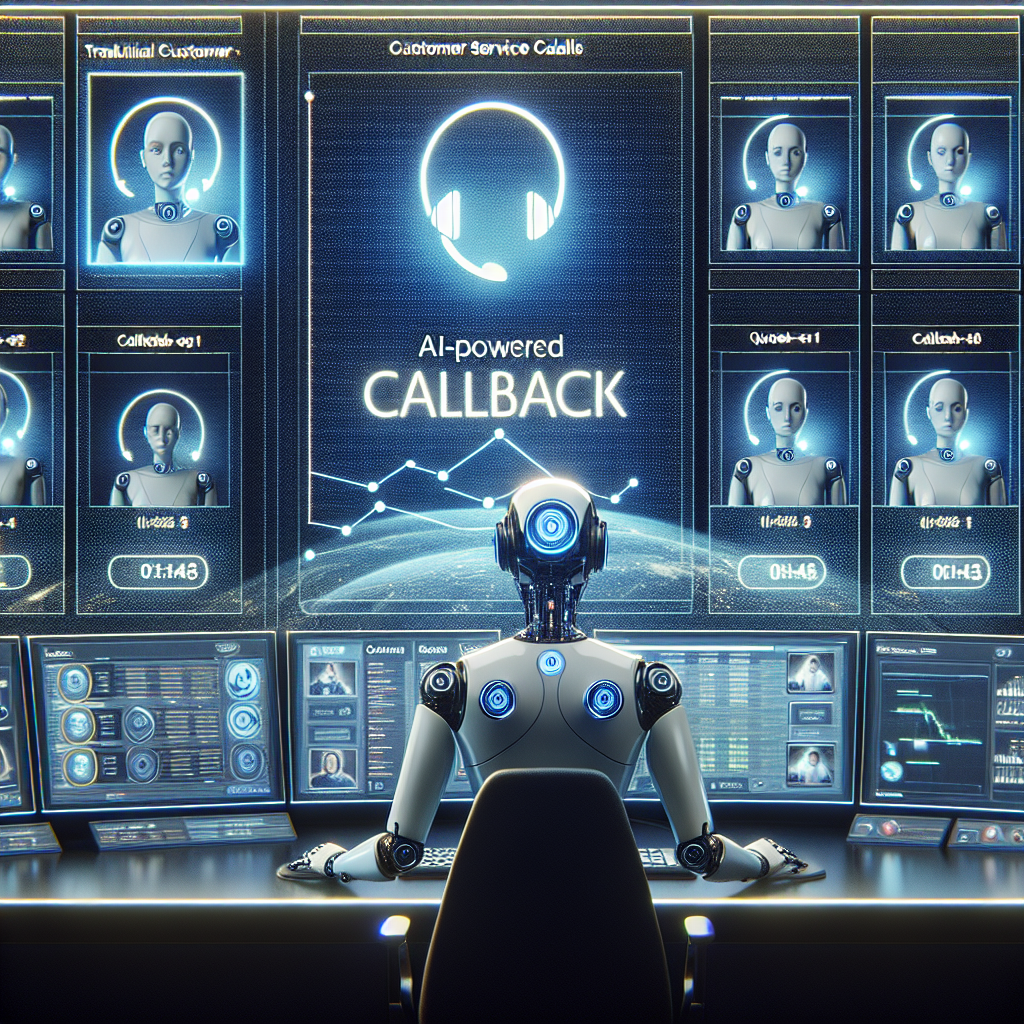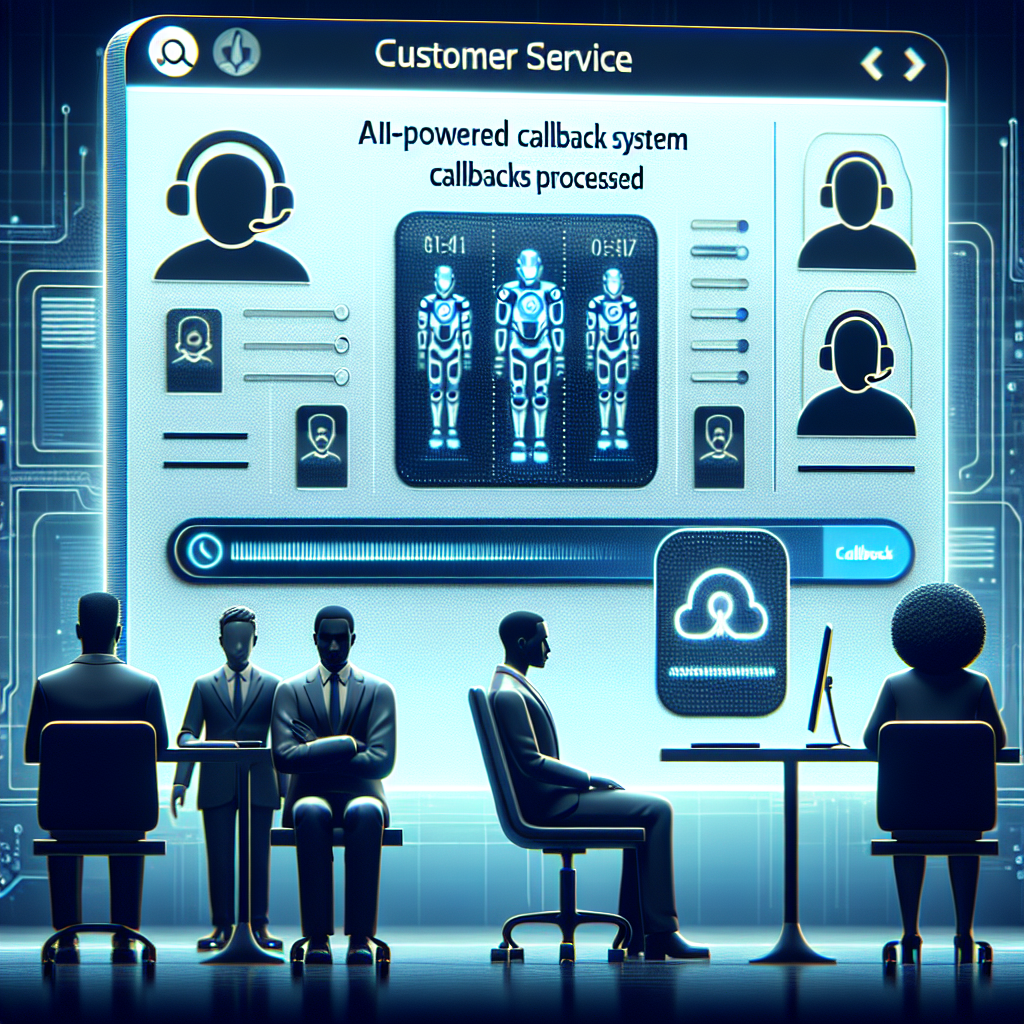
In the constantly evolving digital age, the role of customer service agents is significant. However, the traditional method of engaging with customers could lead to increased waiting times due to high call volumes or complexities of certain issues. The solution to this challenge comes in the form of AI-Powered Callback Systems, a revolutionary trend that is rapidly gaining traction in modern customer service operations.

This novel approach employs an AI technology to analyze the frequency and reason for customer calls, predict the need for a callback and then proactively initiate it, therefore drastically reducing customer waiting times. Moreover, the AI is capable of comprehending natural language, making it more interactive and responsive to customer needs. A detailed explanation of how AI processes natural language can be found with a simple search for "AI and Natural Language Processing".
AI-powered callback systems also ensure that call centers are not overwhelmed during peak hours by evenly distributing calls throughout the day. Whether it's a minor query or a complex issue that may require managerial intervention, the AI can decide if a callback is necessary and make the call when an agent is available. To know more about how the system makes such decisions, look for "AI decision making in callback systems".
By leveraging AI-powered callback systems, companies can optimize their customer service operations. The benefits are manifold- significantly cut down waiting times, better distribution of agent workload, and ultimately, improved customer satisfaction. These systems are not just a passing trend; they are redefining the customer service landscape in the age of AI.
No one prefers to wait, especially when they seek prompt help or information. This system exemplifies how science and innovation are striving hard to prioritize customer's time without compromising quality. This serves as a solid testament to the potential of AI in enhancing customer service experience - a future where waiting is historic.
In an era where immediacy is highly valued, extended call wait times can be a source of frustration for customers and a detriment to businesses. This is where the power of AI-powered callback systems comes into play. These ingenious systems serve the dual purpose of enhancing customer experience and improving business efficiency.
AI-powered callback systems leverage advanced machine learning techniques and sophisticated algorithms to manage and prioritize callback requests. Regardless of the volume of call requests, these systems ensure that every customer is attended to, thereby significantly reducing customer wait times.
Digging deeper into the technology, these systems operate in three key phases: Call request detection, queue management, and callback initiation. In the first phase, the system detects an incoming call request. If an agent is available, the call is immediately connected. If not, the option for a callback is given to the customer. This phase spots a customer's need for assistance and swiftly moves onto the next phase.
In the second phase, an emphasis is placed on queue management. Here, the system efficiently arranges callback requests based on various factors like customer priority, issue urgency, and the estimated time for an agent to become available. An advanced algorithm enables the system to analytically arrange these requests in the queue in a logical and efficient manner.
The third and final phase involves initiating the callback. Here, the AI system dials back the customer as per the determined schedule, hence minimizing waiting time and enhancing the customer’s overall experience. By doing so, the system ensures a customer-friendly, time-conscious, and efficient call management process.
To conclude, AI-powered callback systems strategically employ machine learning and complex algorithms to minimize customer wait times and maximize agent efficiency. By intelligently juggling customer requests, these systems ensure that every call is a call answered - creating a win-win situation for all.
AI-powered callback systems have emerged as an innovative solution to transform customer service efficiency. These systems incorporate artificial intelligence technologies, such as real-time analytics and automation, to reduce customer wait times and streamline support operations. There are numerous reasons why businesses are increasingly looking to implement AI-powered callback systems in their customer service departments.

Firstly, these systems significantly enhance customer satisfaction. They eliminate the dreaded wait time on hold, allowing customers to request a call back at their convenience rather than waiting indefinitely. An AI callback system drives customer engagement, tangibly lowering customer frustration and enhancing their overall experience.
Moreover, AI-powered callback systems work wonders in reducing overhead costs. By prioritizing call traffic, they release the pressure on live agents, decreasing the need for additional staff during peak hours. Thus, businesses can concentrate resources where they need them most, thereby optimizing their operational costs.
Thirdly, these systems provide the benefit of resource optimization. Thanks to AI capabilities, they can anticipate the complexity of a customer's issue based on their initial query, and direct the call to the most suitable agent. Further, the system can predict call times and manage them efficiently, optimizing workforce management.
Lastly, AI-powered callback solutions facilitate improved data collection and analysis. They analyze multiple metrics related to customer engagement and satisfaction levels, enabling businesses to refine their customer service. Overall, these systems are a significant step towards smarter, more efficient customer service management.
As customer expectations continue to rise, businesses cannot ignore the multiple advantages offered by AI powered callback systems - enhancing customer satisfaction, reducing costs, optimizing resources and delivering actionable insights through data.
In today's tech-forward business environment, an advanced AI-Powered Callback System forms an essential part of providing exceptional customer service. The USP of these systems is that they effortlessly and seamlessly integrate with existing Customer Relationship Management (CRM) systems and various communication platforms, paving the way for streamlined service delivery.
The integration of callback technology with CRM systems results in creating a more personalized experience for customers. Upon receiving a callback request, the AI callback system analyzes the historical customer data available on the CRM. This information aids in understanding customer behavior, preferences, and needs, ultimately leading to better service provision.
Moreover, these AI-driven callback systems can perfectly dovetail with various communication platforms. Whether it is a telephonic conversation, online chat, or even an email exchange, these systems can efficiently manage and streamline all of them. Such ingenuity of the AI callback systems provides a hassle-free and unified communication experience to the customers. Unified communication underlines the flexibility and adaptation of AI technology to multiple communication channels, thereby facilitating smooth and uninterrupted conversation with customers.
The greatness of an AI-Powered Callback System lies in its agility, compatibility, and adaptability. For instance, it can easily harmonize with multiple systems, whether it is a legacy system or cutting-edge technology. It bridges the gap between the standalone technologies and provides a cohesive environment focused on maximizing customer satisfaction. Such an integrated approach helps in minimizing wait times and meeting customer expectations effectively.
In conclusion, the integration of AI-Powered Callback Systems with existing technologies is reinventing the customer service landscape. Businesses seeking to reduce customer wait times and deliver efficient, personalized services should invest in these sophisticated callback systems.
Embracing modern technology, several forward-thinking companies have successfully integrated AI-powered callback systems into their customer service strategies. A few remarkable instances underscore the significant impacts these systems have had on reducing customer wait times and boosting satisfaction levels, thus revolutionizing customer service metrics.

The first case in point is Vodafone. The telecommunications giant leveraged an AI callback platform to offer a fresh and seamless experience to its customers. In doing so, it vitally reduced the average hold time by an impressive 15%. As a result, customer satisfaction scores rose, demonstrating the value of implementing this advanced system.
Another captivating example is Best Buy. As a major retailer with a huge customer base, wait times were a significant challenge. However, after implementing an AI-powered callback system, Best Buy achieved a notable reduction in customer wait times, translating into enhanced customer experiences and improved operational efficiency.
Beyond the commercial sector, even healthcare providers, such as Cleveland Clinic, have begun to take advantage of AI-powered callback systems. By proactively managing callback requests, the renowned healthcare provider was able to considerably cut down on hold times, thus optimizing patient experiences.
In summary, these real-world examples exhibit the transformative effects of incorporating AI-powered callback systems into customer service strategies. Through intelligent callback management, companies can enrich customer experience, minimize waiting times, and optimize operational workflow, reiterating the axiom, ''customer is king''.
In the era of ever-evolving artificial intelligence technologies, AI-powered callback systems are promising significant leap forwards in the realm of customer service. We now look towards the future to explore emerging trends and potential advancements that may further minimize customer wait times and drive considerable improvements in the customer experience.
The core strength of modern callback software lies in its ability to schedule optimal call times based on callers convenience, thereby offering a personalized approach to service. In the near future, the AI-powered callback technology is poised to further amplify this premise through advanced AI algorithms and predictive scheduling. This approach will analyze call data in real-time and predict the most suitable time to initiate a callback, considering variables such as the customer’s availability and the estimated agent handling time.
Another space ripe for innovation involves further infusion of AI in interactive voice responses (IVR). Already, AI is increasingly bridging the gap between human and machine interaction through speech recognition and natural language processing. Future IVR systems, integrated with AI-powered callbacks, could potentially understand complex customer requests, and accordingly prioritize and schedule callbacks.
Additionally, deep integration between callback systems and various other customer service software like CRM, ticket management systems, and even social media management apps will provide a more nuanced view of the customer profile to the service agents – thus ensuring more effective and efficient callbacks.
The drive towards personalization is likely to be one of the key trends. AI will not only take into account schedule preferences of the customer, but also their communication preferences. For instance, the system could recall that a specific customer prefers a formal tone, or another prefers communication over text.
As we gaze into the future, it is certain that advancements in AI and Machine Learning will continue to revolutionize the callback technology, transforming how businesses interact with their customers and providing unprecedented improvements in customer service efficiency and effectiveness.
Start your free trial for My AI Front Desk today, it takes minutes to setup!








